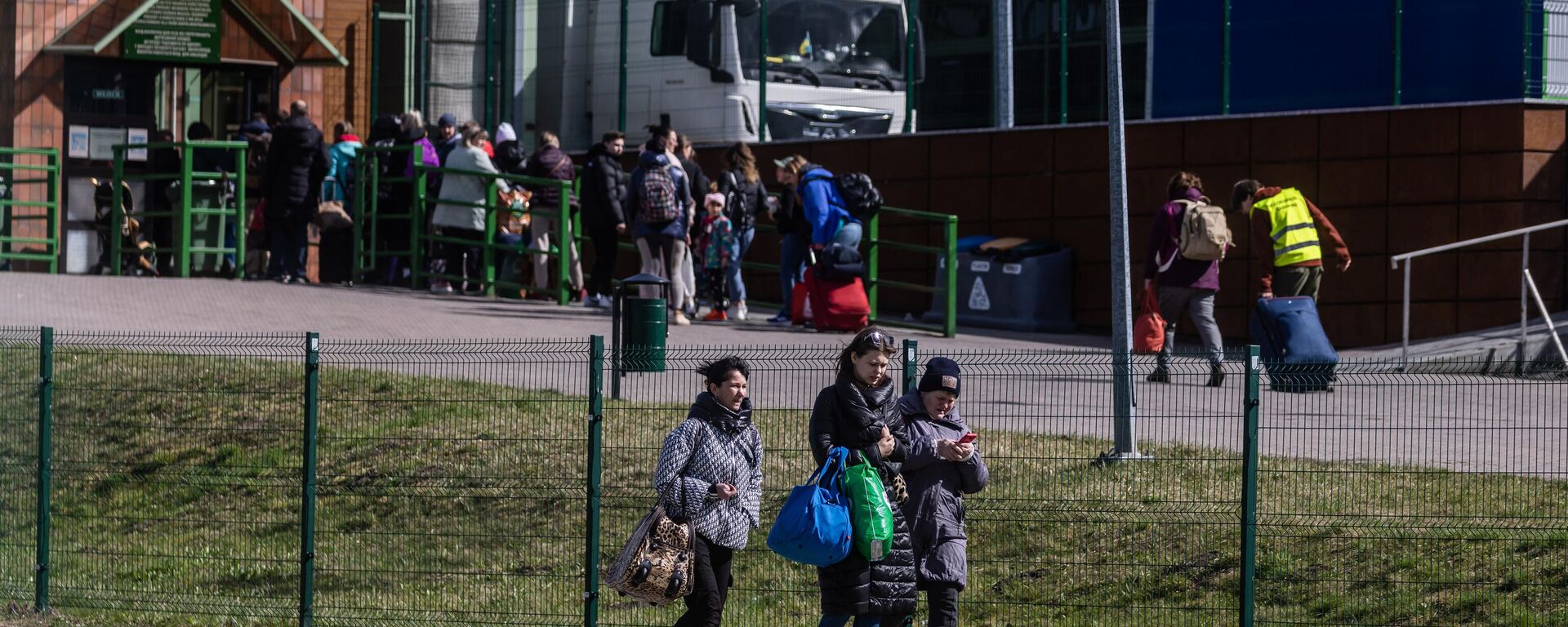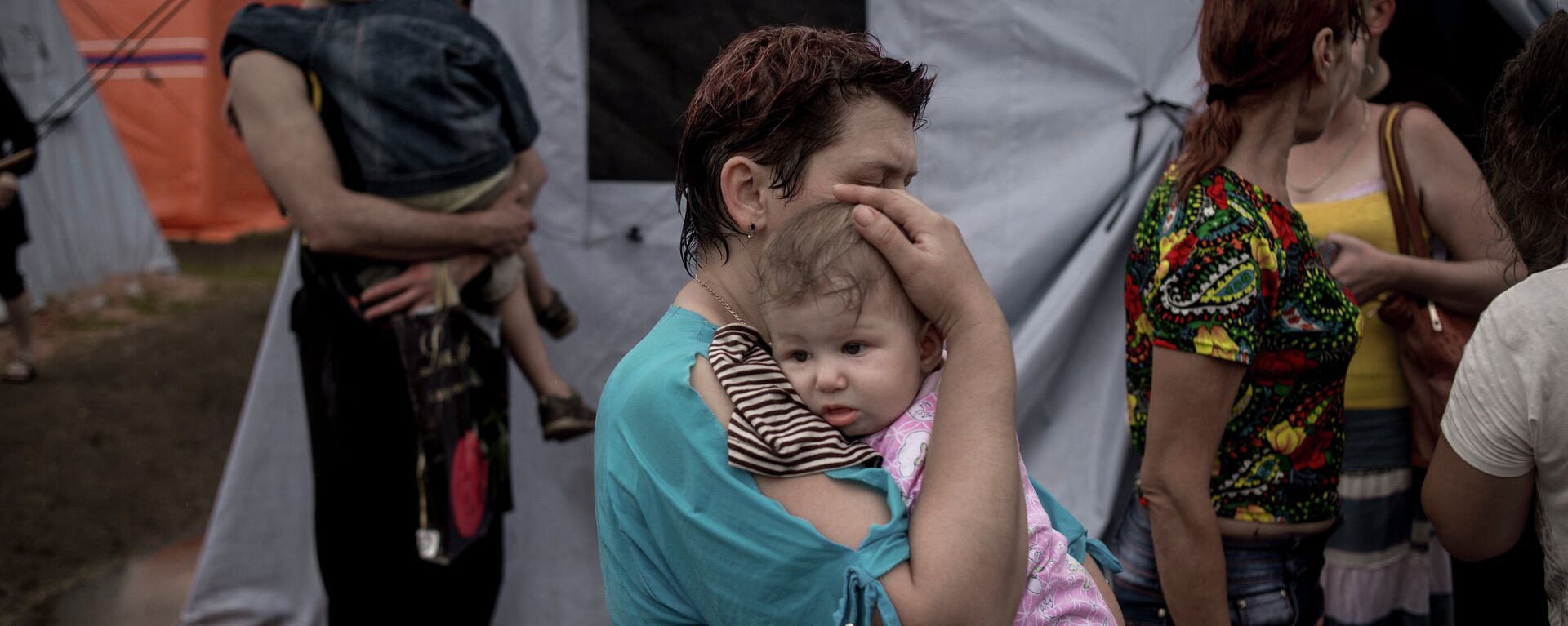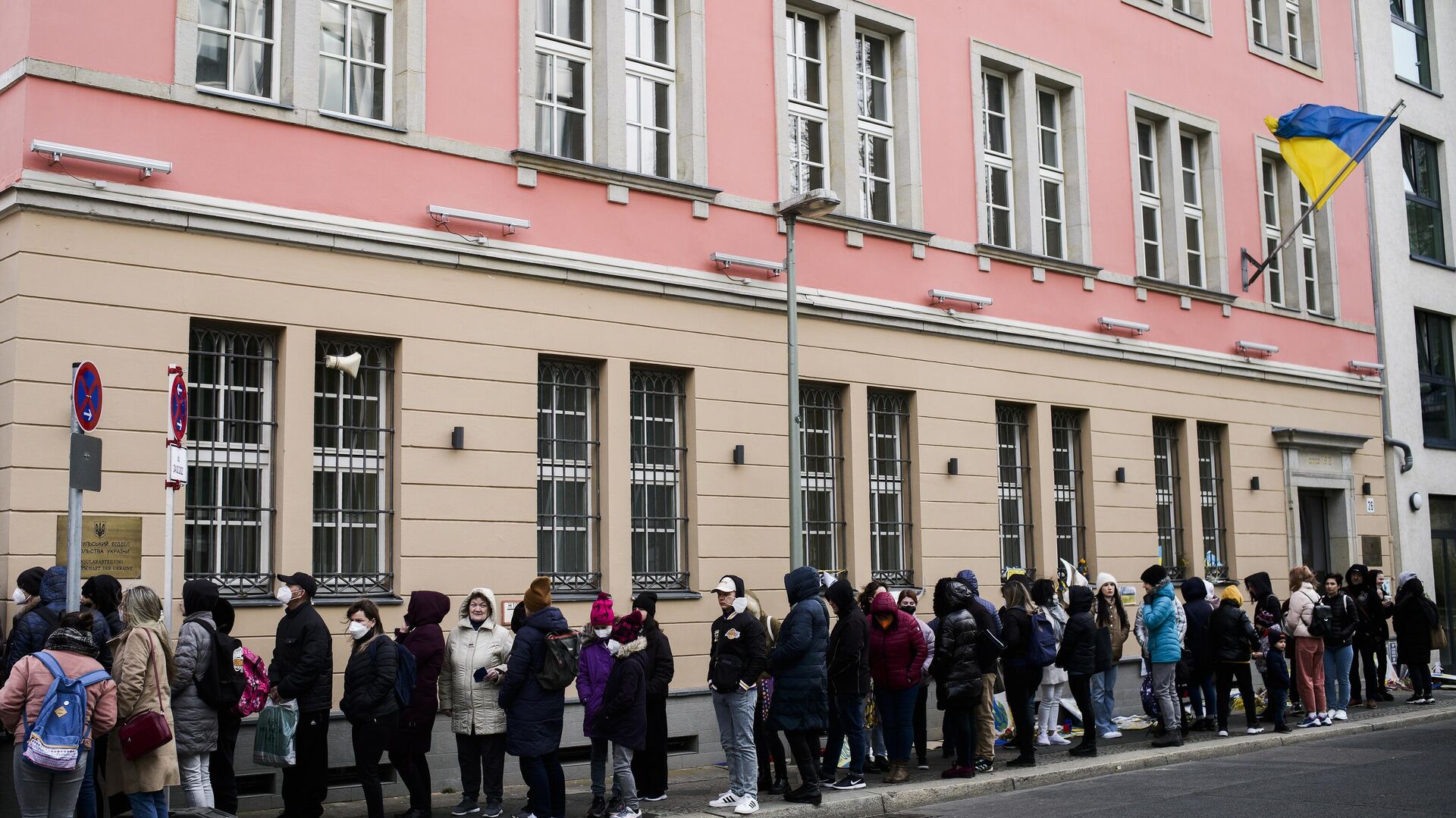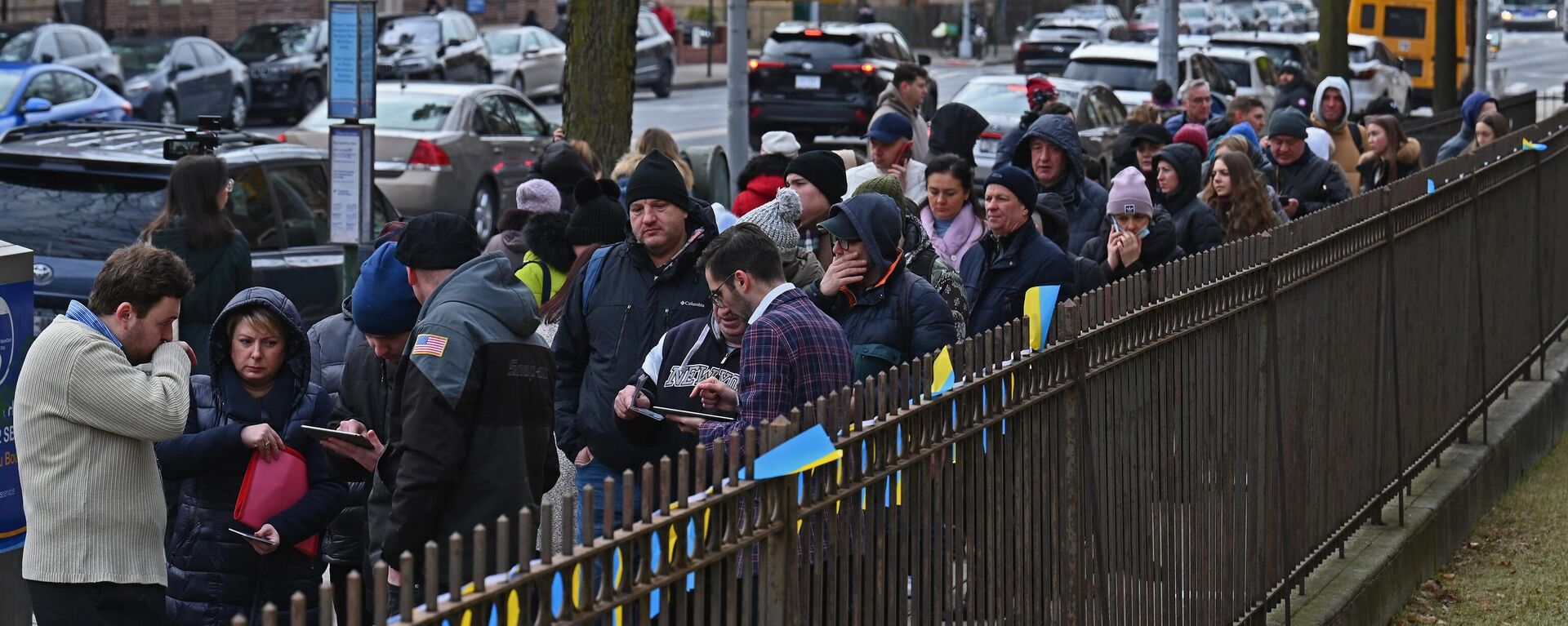https://sputnikglobe.com/20230917/ukrainian-refugees-in-europe-sound-alarm-as-child-welfare-services-snatch-their-children-1113441902.html
Ukrainian Refugees in Europe Sound Alarm as Child Welfare Services Snatch Their Children
Ukrainian Refugees in Europe Sound Alarm as Child Welfare Services Snatch Their Children
Sputnik International
As many as six million Ukrainians have registered as refugees in nations across Europe amid the NATO-Russia proxy conflict in their home country, with women, often accompanied by children, accounting for about 70 percent of the total.
2023-09-17T19:19+0000
2023-09-17T19:19+0000
2023-09-17T19:26+0000
ukraine
european union (eu)
ukrainian embassy
refugees
children
world
https://cdn1.img.sputnikglobe.com/img/07e7/09/11/1113441745_0:153:3097:1895_1920x0_80_0_0_ca066a285d91da1c385f1bb9ec451eea.jpg
Hundreds of Ukrainian families who fled to Europe as refugees have had their children taken away from them by the child welfare services of European Union member states. While protective custody is supposed to protect children against serious parental abuse, including physical violence or sexual crimes, refugees have complained that their kids can be snatched from them for far less serious transgressions, like keeping children home from school without a good excuse.Elena’s 10-year-old daughter, who suffers from developmental disabilities, was taken away from her by German social services agency Jugendamt in November 2022 on the basis of “suspicious behavior” and suspected risks to the child’s well-being. Elena believes that her depression, and the prescription of too strong a dose of antidepressants, led to a complaint to the Jugendamt from school staff on the suspicion that she was taking illegal drugs.“We had communicated for a year already. They knew that we’re a normal family...They told me they thought that I was doing drugs, but they could have simply asked,” Elena, who is from Lugansk, said, referring to the school staff who made the complaint.The woman wasn’t allowed to see her daughter over a period of more than two months, after which she was allowed to visit, but only under strict supervision. “We were locked in a room like criminals and even spied on,” Elena said. The woman said she “didn’t recognize” her daughter after they were split apart, with the child’s mental state deteriorating. “She cried constantly and even now she is afraid to sleep alone.”It took Elena until January of 2023 to get her child back, with appeals to public organizations, the Ukrainian Embassy and even the European Parliament proving useless, and Jugendamt reversing its decision only after the woman lawyered up. The experience traumatized both her daughter and Elena, who is now seeing a psychotherapist.Tatiana, a 49-year-old from Lvov, western Ukraine living in Weiden, Bavaria, has fought authorities for the return of her six-year-old son for four months, with the child taken away after her after the boy’s grandmother complained about alleged physical abuse. Tatiana denies doing anything wrong, saying she always fulfilled her parental responsibilities “properly.”“How is it possible – we received temporary shelter here, this is a Ukrainian child. Ukraine should not sit on the sidelines while its children are taken away,” Tatnyana insisted.A court ordered the woman to undergo a psychiatric examination, and do personal and family psychotherapy. A hearing in her case is scheduled for late November. In the meantime, she will have to continue waiting for her child.In June of 2023, the office of the Ukrainian Human Rights Commissioner said at least 240 children had been removed from the custody of their parents or guardians in EU countries and placed under state protective custody.Others fear that the figures may be far higher, and that Ukrainian authorities don’t want to get on the wrong side of their EU benefactors, upon whom they depend on for political, economic and military support in the proxy war against Russia. In 2022, Russian investigators reported on hundreds of children from Kherson region and the Donetsk city of Mariupol being sent to European countries and disappearing completely, with Dutch children’s rights groups sounding the alarm last year about 170 Ukrainian teenagers under age 18 traveling to the Netherlands without their parents and vanishing, not being registered or provided with a guardian.The reasons given by European protective services for taking away refugees’ children vary dramatically, from alcoholism, mental illness, beatings, abuse and even sexual crimes, to far less serious transgressions, such as leaving children alone at home unsupervised to go to work.Elena Rozvadovskaya, the co-founder of a children’s charity, says the law in Germany is so strict that “if it’s not during the holidays, if a police officer sees a child at the airport, he will inquire as to why the parents are acting in such an irresponsible manner in the middle of a school year.” In Europe, she said, the social services are incentivized to look into activity they may deem suspicious much more quickly than in Ukraine.
https://sputnikglobe.com/20230902/polands-largest-facility-for-ukrainian-refugees-reportedly-closes-1113080565.html
https://sputnikglobe.com/20230826/which-eu-countries-have-most-ukrainian-refugees-1112867187.html
https://sputnikglobe.com/20230506/eu-mulls-paying-ukrainian-refugees-to-go-home-despite-cost-implications-1110139317.html
ukraine
Sputnik International
feedback@sputniknews.com
+74956456601
MIA „Rossiya Segodnya“
2023
News
en_EN
Sputnik International
feedback@sputniknews.com
+74956456601
MIA „Rossiya Segodnya“
Sputnik International
feedback@sputniknews.com
+74956456601
MIA „Rossiya Segodnya“
ukraine, refugees, europe, child services, protective services, snatch,
ukraine, refugees, europe, child services, protective services, snatch,
Ukrainian Refugees in Europe Sound Alarm as Child Welfare Services Snatch Their Children
19:19 GMT 17.09.2023 (Updated: 19:26 GMT 17.09.2023) As many as six million Ukrainians have registered as refugees in nations across Europe amid the NATO-Russia proxy conflict in their home country, with women, often accompanied by children, accounting for about 70 percent of the total.
Hundreds of Ukrainian families who fled to Europe as refugees have had their children taken away from them by the child welfare services of European Union member states. While protective custody is supposed to protect children against serious parental abuse, including physical violence or sexual crimes, refugees have complained that their kids can be snatched from them for far less serious transgressions, like keeping children home from school without a good excuse.
“If I was some kind of drug addict or hurt my child, [that would be one thing], but no,” a mother named Elena told Ukrainian-language British state-funded media in a piece published Sunday. “I myself used to work for an international foundation involved in protecting children’s rights. And here they take my child away from me. This is just a terrible situation,” the woman said.
Elena’s 10-year-old daughter, who suffers from developmental disabilities, was taken away from her by German social services agency Jugendamt in November 2022 on the basis of “suspicious behavior” and suspected risks to the child’s well-being. Elena believes that her depression, and the prescription of too strong a dose of antidepressants, led to a complaint to the Jugendamt from school staff on the suspicion that she was taking illegal drugs.

2 September 2023, 17:29 GMT
“We had communicated for a year already. They knew that we’re a normal family...They told me they thought that I was doing drugs, but they could have simply asked,” Elena, who is from Lugansk, said, referring to the school staff who made the complaint.
The woman wasn’t allowed to see her daughter over a period of more than two months, after which she was allowed to visit, but only under strict supervision. “We were locked in a room like criminals and even spied on,” Elena said. The woman said she “didn’t recognize” her daughter after they were split apart, with the child’s mental state deteriorating. “She cried constantly and even now she is afraid to sleep alone.”
It took Elena until January of 2023 to get her child back, with appeals to public organizations, the Ukrainian Embassy and even the European Parliament proving useless, and Jugendamt reversing its decision only after the woman lawyered up. The experience traumatized both her daughter and Elena, who is now seeing a psychotherapist.
Tatiana, a 49-year-old from Lvov, western Ukraine living in Weiden, Bavaria, has fought authorities for the return of her six-year-old son for four months, with the child taken away after her after the boy’s grandmother complained about alleged physical abuse. Tatiana denies doing anything wrong, saying she always fulfilled her parental responsibilities “properly.”
“I’m not an alcoholic, my home is always tidy, there’s food,” she said. “In three months, I saw my child only once for 20 minutes. That’s just brutal. I didn’t eat or sleep for two weeks. You’re in a foreign country, you don’t know the language, the laws. When I think that I won’t see my child again, I simply don’t want to live anymore.”
“How is it possible – we received temporary shelter here, this is a Ukrainian child. Ukraine should not sit on the sidelines while its children are taken away,” Tatnyana insisted.
A court ordered the woman to undergo a psychiatric examination, and do personal and family psychotherapy. A hearing in her case is scheduled for late November. In the meantime, she will have to continue waiting for her child.

26 August 2023, 18:55 GMT
In June of 2023, the office of the Ukrainian Human Rights Commissioner said at least 240 children had been removed from the custody of their parents or guardians in EU countries and placed under state protective custody.
Others fear that the figures may be far higher, and that Ukrainian authorities don’t want to get on the wrong side of their EU benefactors, upon whom they depend on for political, economic and military support in the proxy war against Russia. In 2022, Russian investigators reported on hundreds of children from Kherson region and the Donetsk city of Mariupol being sent to European countries and disappearing completely, with Dutch children’s rights groups sounding the alarm last year about 170 Ukrainian teenagers under age 18 traveling to the Netherlands without their parents and
vanishing, not being registered or provided with a guardian.
The reasons given by European protective services for taking away refugees’ children vary dramatically, from alcoholism, mental illness, beatings, abuse and even sexual crimes, to far less serious transgressions, such as leaving children alone at home unsupervised to go to work.
Ninel Omelyanenko, a psychotherapist volunteering at a refugee center in Geneva, Switzerland, recalled a situation in which a completely normal Ukrainian woman got a warning from child services and ordered to undergo drug testing after her child, who had been sick with chickenpox, failed to show up to school for two weeks, with social services ending up coming to her house and calling the police after the frightened woman wouldn’t open the door for them.
Elena Rozvadovskaya, the co-founder of a children’s charity, says the law in Germany is so strict that “if it’s not during the holidays, if a police officer sees a child at the airport, he will inquire as to why the parents are acting in such an irresponsible manner in the middle of a school year.” In Europe, she said, the social services are incentivized to look into activity they may deem suspicious much more quickly than in Ukraine.





